Pharmacists vs. Pharmacy Technicians: Understanding the Key Differences
29 Apr, 20234 minsPharmacists and pharmacy technicians both play vital roles in the pharmacy world…Pharmacists...

Pharmacists and pharmacy technicians both play vital roles in the pharmacy world…
Pharmacists and pharmacy technicians both play vital roles in the pharmacy world, working alongside each other to ensure the smooth running of their pharmacy. But the process of becoming a pharmacist versus a pharmacy technician can look quite different. Reaching each position requires a separate route, and as a result, pharmacists and pharmacy technicians have different duties and responsibilities.
What is the difference in roles between a pharmacist and a pharmacy technician?
One of the biggest differences is that, in general, pharmacists have had more years of comprehensive training than pharmacy technicians. So, pharmacists generally occupy the more senior positions in the pharmacy. They take the lead on more medical-leaning tasks, such as filling prescriptions, consulting patients on medical issues and ensuring everything in the pharmacy meets all the necessary safety and regulatory standards.
Pharmacy technicians often carry out the more clerical and administrative tasks, and are usually the customer / patient facing lead of the pharmacy. They take the lead on many of the essential, bread and butter tasks that keep the pharmacy running on a day to day basis.
While pharmacists are present in all pharmacy settings, you’ll most likely find pharmacy technicians working in community pharmacies, as well as in-store pharmacies in, for example, retail and grocery stores. Pharmacy technicians are less likely to be found in research and development or academic settings.
Job Roles and Responsibilities of Pharmacists
Pharmacists are legally certified to advise patients and prescribe medication, and to instruct doctors on what medicines and dosages to give to patients. Pharmacy technicians, on the other hand, can only prepare and administer medication under the supervision of a pharmacist. And any medication must be legally signed off by the pharmacist first. Pharmacy technicians also can’t recommend specific medications to patients – this has to be done by a pharmacist.
Pharmacists take the lead on the more medical and regulatory related tasks. Their job requires responsibility on things like:
Filling prescriptions and reviewing them for accuracy
Administering vaccinations to patients
Instructing patients how and when to take medicine, including dosage, frequency and side effects
Ensuring any medications prescribed to patients don’t clash or mix badly with medication the patient is already taking
Carrying out health screenings
Reviewing and approving orders of medication and other items required for the pharmacy
Providing general health and wellbeing advice to patients
Ensuring the pharmacy adheres to all laws and regulations of the state in which it is operating
Overseeing the work of pharmacy technicians
Looking for Pharmacist Job Roles?
Job Roles and Responsibilities of Pharmacy Technicians
Pharmacy technicians are usually responsible for the more clerical, administrative and customer service-focused tasks, such as:
Packaging and labelling prescriptions
Organizing the pharmacy inventory and restocking as required
Informing pharmacists what needs to be ordered
Customer service tasks such as taking payments and talking to customers on the phone or in person
Fielding basic questions from customers. Any more advanced or medical-related questions are passed on to a pharmacist
Collecting information from patients
Processing insurance information and documents, and liaising with insurance companies as required
General administration, including billing, record keeping and managing insurance paperwork
Looking for Pharmacy Technician Jobs?
Pharmacist vs. a Pharmacy Technician: Skills and Qualifications Required
While the routes to becoming a pharmacist and pharmacy technician have some similarities, there are certain skills that lend themselves more to one role than another. Additionally, the two roles require quite different levels of education and qualification.
Some skills and attributes are universally important for any pharmaceutical role. This includes, for example, attention to detail – an incorrect dosage or the wrong medication can have potentially lethal consequences, so it’s important to get the details right – and mathematical and arithmetic skills. Both pharmacists and pharmacy technician will have to calculate quantities of pills and medication, so this is important in both roles.
For pharmacy technicians, strong customer service and people-skills are usually important. Pharmacy techs are often the first point of contact for patients, so a professional, courteous and friendly manner is essential. Additionally, pharmacy technicians often gather information from patients on behalf of the pharmacists, so being a good listener is important in order to gather accurate, comprehensive information. Strong organizational skills are also a must for pharmacy technicians, as pharmacy techs often do the lions share of organizing and restocking the pharmacy’s inventory.
Where we see a major difference between pharmacists and pharmacy technicians is in their qualifications and certifications.
Pharmacy technicians typically do a pharmacy tech program that lasts 1-2 years, covering things like pharmacology, medication dosing and how to calculate doses, pharmaceutical law and ethics, and inventory management. While a handful of states, for example Hawaii and Wisconsin, have no licensing or certification requirements for pharmacy technicians, most states require that pharmacy techs are either licensed, or both licensed and nationally certified. You can see in this handy map from the Pharmacy Technician Certification Board (https://www.ptcb.org/resources/state-regulations-and-map) what the requirements are state by state.
The route to becoming a pharmacist is somewhat longer vs. the route to becoming a pharmacy technician. Pharmacists typically complete a foundation course in something relevant to the pharmaceutical field, such as mathematics or one of the sciences, followed by their Pharm D course and then a pharmacy residency. Then, to become a fully-fledged pharmacist, pharmacists are required to pass a national licensing exam and a state law exam, on top of whatever additional state level requirements exist. In total, most pharmacists spend 6 to 8 years in school and in training before they are fully qualified as a pharmacist.
Salary Comparison: Pharmacist vs. Pharmacy Technician Salary
Given that pharmacists spend significantly longer in education and training than pharmacy technicians, and take on the more complex medical and regulatory responsibilities, they unsurprisingly earn significantly more than pharmacy technicians. The median salary for a pharmacist in 2021 was $128,570 compared to $36,740 for pharmacy technicians.
One area where a career as a pharmacy technician has the edge over a career as a pharmacist is job growth. The US Bureau of Labor Statistics predicts pharmacy technician jobs to grow 4% by 2030, while the number of pharmacist roles will decline 2%. This is mainly due to more people getting their prescriptions online and pharmacy technicians taking on some of the more basic responsibilities from pharmacists.
Pharmacist or Pharmacy Technician – Which Career Is Right For Me?
As described above, one major difference between pharmacists and pharmacy technicians is the amount of time in school and training required for each role, and the level of responsibility taken on once qualified. If you want to work in a pharmaceutical setting, but don’t want to spend 6 to 8 years in education and training, or take on significant medical or managerial responsibility, then a career as a pharmacy technician may be right for you.
A career as a pharmacist is perfect for those who are keen on taking on significant responsibilities in a pharmaceutical setting, and have a strong interest in the medical, clinical and regulatory side of things.
Can you become a pharmacist after becoming a pharmacy technician?
Of course! Many pharmacy technicians have the knowledge and skills required to become great pharmacists. However you will have to undergo the same route of courses, examinations, and training as listed above to become a fully qualified pharmacist.
At the end of the day, both are interesting, fulfilling careers in which you can make a major difference to the lives of your patients. So whether you pursue a career as a pharmacist or a pharmacy technician, you’ll be playing an essential role in making your patients happier and healthier! Consult with our industry experts to find the right fit for you.
Get Hired Today!




